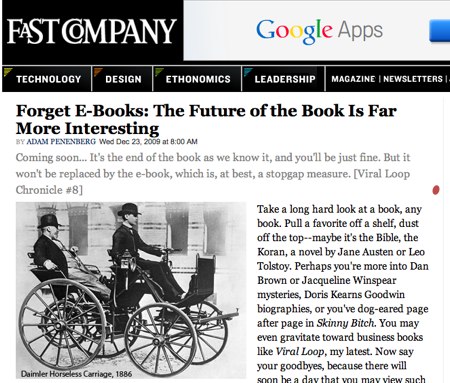eBook Prognostication
Stacey Mason/Mark Bernstein

Adam Penenberg speculates on the evolution of the book and future of reading. Unusually for pundits dazzled by the Kindle and iPhone, Penenberg observes that the real future of eBooks surely lies in books that do more – not merely paper simulators or books with video illustration.
The first movie cameras were used to film theater productions. It took early cinematic geniuses like Sergei Eisenstein, Fritz Lang, Charlie Chaplin and Abel Gance to untether the camera from what was and transform it into what it would become: a new art form. I believe that this dynamic will soon be replayed, except it will star the book in the role of the theater production, with authors acting more like directors and production companies than straight wordsmiths. […] Instead of stagnant words on a page we will layer video throughout the text, add photos, hyperlink material, engage social networks of readers who will add their own videos, photos, and wikified information so that these multimedia books become living,
Much of Penenberg’s vision, while accurate, is not very new. When he writes that
A novelist could create whole new realities, a pastiche of video and audio and words and images that could rain down on the user, offering metaphors for artistic expressions. Or they could warp into videogame-like worlds where readers become characters and through the expression of their own free will alter the story to fit. They could come with music soundtracks or be directed or produced by renowned documentarians. They could be collaborations or one-woman projects.
he’s saying rather less than Robert Coover wrote in 1992, or Eric Drexler wrote in 1987, or Ted Nelson in 1976. Though Penenberg couches this paragraph in the future conditional, all these possibilities (and more!) have been realized in published works.
The article sparked some interesting and intelligent comments. Maryanne Conlin posts:
I do however have to ask- why veer away from the analogy in the article? I DO agree with your vision of the “ebook” of the future…but I also think, as we still have lots of theatre production of all sizes today….we will still have books published too!
Just because we have newer, richer forms of media does not mean that the old ones must die. Though computers can create stunning digital images, the oil painting has not been cast carelessly aside.
